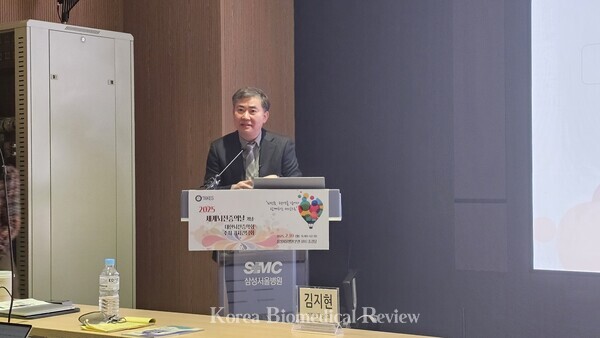The Korean Epilepsy Society (KES) highlighted the causes and treatments of epilepsy and called for improving public awareness at a news conference on Monday to commemorate World Epilepsy Day 2025.
World Epilepsy Day, observed on the second Monday of February each year, has been marked globally since 2015 under the leadership of the International Bureau for Epilepsy (IBE) and the International League Against Epilepsy (ILAE). The event aims to educate people about neurological disorders and combat the associated stigma.

Epilepsy is a chronic condition characterized by recurrent seizures that require continuous medication.
According to the World Health Organization (WHO), about 50 million people worldwide live with epilepsy, and an estimated 20 to 70 new cases occur per 100,000 people annually. The condition can develop at any stage of life, from infancy to old age.
While epilepsy can be linked to various causes, including genetic, structural, metabolic, infectious, and immune-related factors, more than half of all cases have no identifiable cause.
Seizures, the primary symptom of epilepsy, can sometimes be confused with other medical conditions, such as fainting, movement disorders, and sleep disturbances. Also, psychogenic non-epileptic seizures, triggered by psychological stress, can resemble epileptic seizures, making diagnosis challenging.
“Accurate diagnosis is crucial to avoid unnecessary use of anti-seizure medications,” said Professor Han Sun-jung of the Department of Neurology at Wonkwang University Hospital. “Patients and their caregivers should document seizure history with videos and provide detailed descriptions of symptoms, which can greatly aid in medical assessments.”
‘Korea passing’ phenomenon in anti-seizure medications
During the news conference, KES also highlighted that despite continuous advancements in epilepsy treatments, Korea lags in the introduction of new anti-seizure medications.
Globally available drugs, including Xcopri, Briviact, and Fintepla, have yet to be introduced in the country. Similarly, innovative emergency seizure treatments in the form of nasal and rectal sprays remain inaccessible to Korean patients.
Professor Kim Jae-rim of the Department of Neurology at Seoul National University Bundang Hospital attributed this to the “Korea passing” phenomenon, in which pharmaceutical companies bypass Korea when launching new drugs.
“Approximately two-thirds of epilepsy patients can achieve seizure-free daily lives with proper medication, and some can even be cured. For drug-resistant epilepsy patients, alternative treatments such as brain surgery, ketogenic diets, cannabinoids, and vagus nerve stimulation can be beneficial,” Professor Kim said.
Professor Kim also emphasized the need to address the delayed introduction of some new drugs due to Korean passing.
“Korea is considered a reference country for drug pricing in Asia,” Kim explained. “Because the country aims to secure medications at the lowest possible price, pharmaceutical companies are reluctant to introduce new treatments here.”
Despite progress in understanding epilepsy, KES also highlighted that public awareness remains low.
According to Professor Han Su-hyun of the Department of Neurology at Chung-Ang University Hospital, only 5 percent of Koreans correctly understand the causes of epilepsy, despite awareness doubling over the past decade. Many still mistakenly believe that epilepsy is a mental illness, an infectious disease, or a hereditary condition.
The stigma extends to the workplace. Epilepsy patients in Korea face persistent discrimination in employment, with employers and colleagues holding more negative perceptions compared to other countries.
According to Professor Yoon Song-yi from Kyung Hee University School of Medicine’s Department of Pediatric Neurology, employment rates for people with epilepsy remain significantly lower than those of the general population.
While certain high-risk occupations, such as aircraft pilots and air traffic controllers, are restricted to individuals with epilepsy under guidelines from the Korea Occupational Safety and Health Agency, most jobs should be accessible with proper medical management.
Driving is also permitted for those who have been seizure-free for over a year without reducing medication.
Emergency response and public education efforts
Knowing how to assist a person experiencing a seizure is critical. Professor Byeon Jung-hye from Korea University School of Medicine’s Department of Pediatric Neurology emphasized that during a seizure, bystanders should clear the surrounding area of sharp objects and hot items, place the patient on their side to keep their airway open, and provide cushioning for their head.
“People should never attempt to put water, medication, or any objects into the person’s mouth, nor should they forcibly restrain their movements,” Byeon advised.
Seizures typically last between one and three minutes, but emergency medical assistance is necessary if they persist beyond five minutes.
To improve public awareness, KES has partnered with Ocon, the company behind the beloved children’s character Pororo, to develop educational materials.
“Epilepsy is one of the four most common chronic brain diseases, alongside stroke, dementia, and migraines,” KES President Seo Dae-won said. “With an aging population, epilepsy incidence is increasing, making awareness efforts more crucial than ever.”
Related articles
- SK biopharmaceuticals unveils AI-driven epilepsy management platform at SK AI Summit
- 'Epilepsy caused by stroke, dementia, and brain tumor can be managed with medication'
- Do runny nose drugs for kids trigger or worsen epileptic seizures?
- Epilepsy rises in older adults, leading to 'epileptic sudden death’
- Bill proposed to enhance state support for epilepsy patients
- Korean hospitals gain approval for SK biopharmaceuticals' epilepsy drug ahead of domestic launch
- Pediatric emergency center designation stalled due to lack of hospital applicants
- Pfizer’s Nurtec approved in Korea, intensifying CGRP migraine treatment competition
- SK Life Science launches 1st US TV campaign to boost awareness of epilepsy drug cenobamate
- Epilepsy, a common disorder in medical blind spots, requires national response

